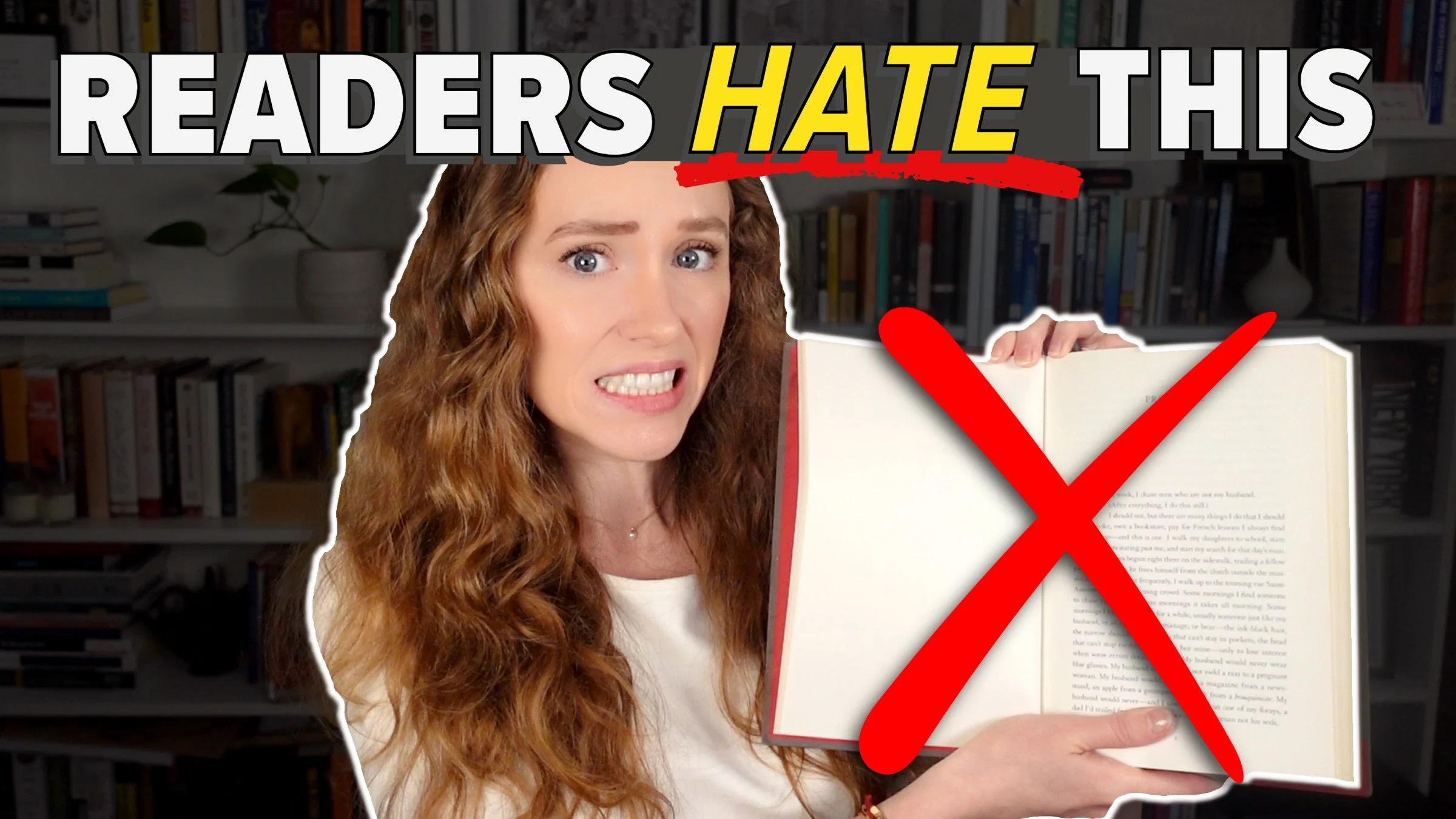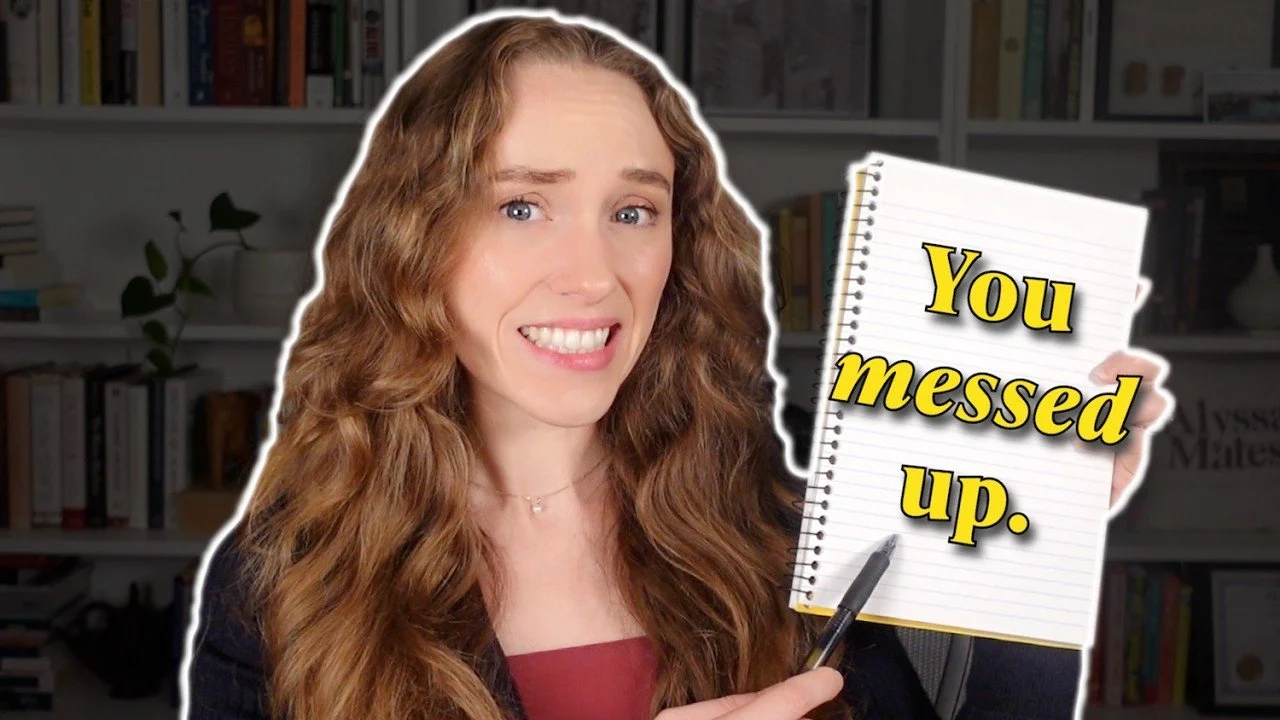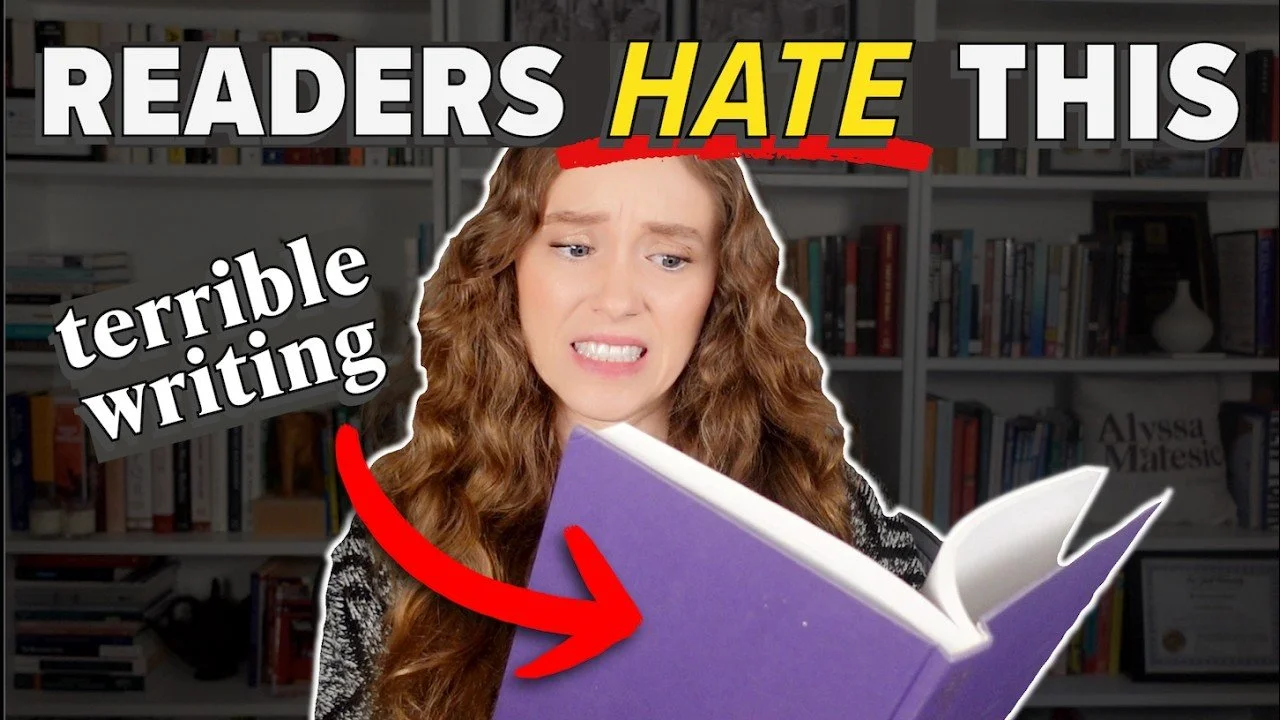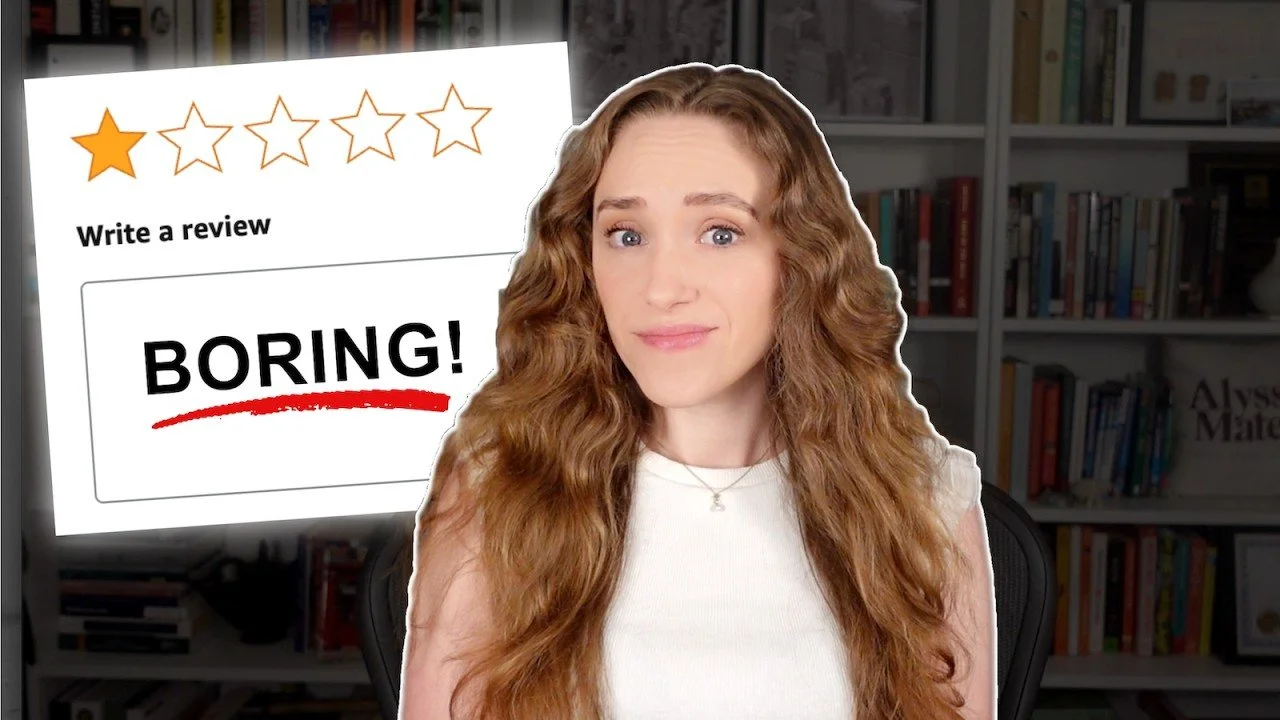7 First Page Mistakes That Could Be Losing You Readers
HIT PLAY OR READ THE POST BELOW:
You only have about 250 words to convince a reader that your story is worth their time. If your first page doesn't work, it doesn't matter if your story is the best thing that's ever been written — because we'll never get there.
When I worked at a top literary agency and at an imprint of Penguin Random House, I evaluated hundreds of opening pages every single week. And it was often that very first page that determined whether I read more or passed on the book.
So, I'm revealing the seven biggest mistakes on the very first page that might be sabotaging your story — and, as always, I'll share exactly how to avoid or fix them.
1. Offering no promise
If your entire first page is just setup — your protagonist's backstory, a lengthy setting description, or a worldbuilding dump — and nothing else, your reader isn't going to stick around. Why would they? You haven't given them any reason to. You haven't promised them anything.
Your first page needs to create a promise with the reader that, if they continue reading, they'll get some kind of payoff. To do that, you need to plant things in the opening page that spark our curiosity — things we want to learn more about. This doesn't mean you need a dead body on the first page (though I always support that if that's what you're writing).
Your points of intrigue can be subtle: a tense conversation between characters that makes us wonder about their history, a reference to a traumatic backstory that makes us want to know what happened, or simply an ominous atmosphere that gives us the sense something sinister is about to happen.
Here's an exercise to stress-test your first page:
Read through it, then write down three questions that your reader will have after finishing it. If you can come up with three strong, juicy questions, then that's a good indication that you're piquing curiosity and promising the reader they'll get something if they continue with the story. But if your first page doesn't stir up several juicy questions, it's not doing its job.
2. Leaning into cliches
There are a few cliché opening scenes that readers — and especially publishing professionals — have seen over and over and over again. Using one will make your opening sound flat and unoriginal: a character abruptly waking up from a terrible dream, a character on a plane about to land in a new destination, or a character reflecting on their entire life story. These cliché openings can work if you put a fresh spin on them, but more often than not, it's better to use a different opening strategy that feels fresher and more exciting.
You also want to avoid cliché language, especially on your first page. If your novel opens with "It was a dark and stormy night," or describes a character’s eyes as sparkling like diamonds, or describes a character crying with tears streaming down their cheeks like rivers, your writing will feel amateurish — and readers will pick up on that.
Your story is unique, right? So it deserves an opening that's unlike anything we've read before.
3. Doesn’t suit the genre
Your cover jacket copy and positioning on the bookshelf or online store will signal to readers what genre the book is. So when they open up to the very first page, they're going to have certain expectations for the type of story they're about to read.
If the first page doesn't match the genre the reader thought they were getting into, then you might have misclassified the book — or you might need to revise the opening scene to better align with your genre.
Let's say your novel is a psychological thriller. Picture a dark, moody cover with an ominous title. But then, if your first page sounds like a YA romcom, with two characters flirting in a high school classroom, you've created a tonal mismatch. The reader will think, "This isn't what I signed up for, and now I don't know if I want to read this." You've eroded their trust in your storytelling.
If it’s the case that your opening scene needs to be tonally distinct from the genre and the rest of the story, you might consider structurally separating it from the main narrative. Perhaps you present it as a prologue or with a header like "10 years ago." These signals tell the reader that this scene is separate from the main narrative, and they’ll forgive it if it doesn’t exactly match their genre expectations.
Beyond genre, though, many authors don’t think hard enough about their intended age category. If you're presenting the novel as middle grade, it should appeal to readers 8 to 12 and likely center on characters in middle school. YA novels should focus on teenage characters and explore themes that are relevant to them. If you begin a YA novel with an elderly woman knitting a sweater for her granddaughter and reflecting on her late husband's death, then readers will wonder if they picked up the wrong book.
4. Sloppy writing
Typos, grammatical errors, and formatting issues make it into published books all the time. But when they show up on the very first page, they're distracting — and they make the reader wonder what they're getting into. Am I just in for 300 pages of sloppy writing?
Do your very best to make your manuscript — especially your first page — as error-free as possible. And make sure to check for all the sneaky stuff, like improper dialogue punctuation, run-on sentences, and inconsistent verb tenses. If you start in present tense, make sure you stick with it. If you start in past tense, you should stay in past tense.
A great trick to catch technical issues in your manuscript is to read your work aloud. It's tedious, but it helps you notice things your eyes will glaze over — since you've read over this thing a hundred times already. Notice the places where you stumble over your words; those sentences likely need some TLC.
But even better, get someone with a great understanding of grammar to read through your manuscript and point out any errors. There might be mistakes you don’t even realize you're making.
5. Having no voice
Voice is how you sound on the page — the specific stylistic choices that make your writing sing. Think of it as your authorial signature. Some authors' voices are lyrical and poetic, while others are sharp and punchy. There's no right or wrong voice, but if you have no voice whatsoever, your writing will sound robotic and flat.
Let's look at an example:
John walked into the room. It was large and dark. He flipped the light switch. Bright light flooded the space.
While this passage is totally grammatically correct, it lacks impact because it has no voice at all. It doesn't feel like there's any intention behind the writing. There's no style, and it's using the same sentence structure over and over again, which sounds stale and monotone.
Now let’s rework this passage to have a stronger voice:
John didn’t expect the room to be this large — or this dark. Where the heck was the light switch? He grazed his hand across the wall until he finally felt it and flipped it on. There was a crackle overhead. Then everything became bright — almost too bright.
Do you see how there’s more intention behind the words? The scene is the exact same, but the style makes this version sound so much more engaging.
Voice can be tough to define, but you can tell immediately if it's there or if it isn't. That’s why literary agents and publishers often talk about looking for writing with a strong voice. So make sure yours shines on page one.
6. Neglecting scene action
Unlike when we're watching a film or a physical play, with a book, you have no set. That means we have no idea where we are until you tell us. We can't use our sight to deduce the physical surroundings — all we have are your words.
Too often, the first page ends up feeling like it's happening in a void. This is especially common if you open with a character reflecting on their life situation or dialogue that has no setup or context. Make sure to give us enough physical anchoring details to ground us in the scene. Who is present? Where are they? What are they doing? Every scene should have enough choreography to orient us.
Are we in a high-rise office, a rural diner, a mossy cave on an alien planet? We don't need paragraphs upon paragraphs of lush setting description, but we do need enough to sketch the scene in our minds. And if you're writing speculative fiction like sci-fi or fantasy, we definitely need enough physical descriptions to orient us in the world. Otherwise, we'll just be confused instead of intrigued.
In all of your scenes — including the first one — make sure to aim for a healthy balance of narrative, dialogue, and action. If you just focus on narrative and dialogue and neglect the action, we’ll have no sense of what’s going on physically, and it will be harder to immerse ourselves in the story. A reader who can’t visualize the story in their mind is a reader who’s more likely to check out.
7. Unclear POV
Does your opening page actually get inside a character's mind? Nine times out of ten, it should.
If I can't tell whose perspective I'm following by the end of the first page, I won't feel connected to the story — and if I'm not connected to the story, I'm not emotionally invested in seeing what happens next. If you're writing in first person or close third person, it's critical to bring the reader into the character's mind on the very first page — perhaps even the very first sentence. We shouldn't feel like we're just seeing the scene play out from a distance, but that we're experiencing it from within the character's mind and body. So show us their thoughts, their emotional responses, their bodily sensations.
I challenge you to look over your first page right now and highlight the phrases or sentences that indicate whose perspective we're in. You should be able to highlight at least a few things — and they should all be tied to the same character.
Let's do this exercise now for the example passage I wrote when we were talking about voice:
John didn’t expect the room to be this large or this dark. Where the heck was the light switch? He grazed his hand across the wall until he finally felt it and flipped it on. There was a crackle overhead. Then everything became bright — almost too bright.
A big reason why this version is more effective and has more voice is because it is clearly in John's POV from the very first sentence, when we learn that he didn’t expect the room to be this large. Then we get his internal question presented as free and direct discourse: Where the heck was the light switch? We also get his thoughts in the line almost too bright.
Unless you're writing omniscient POV — and executing it really, really, really well — we should only inhabit one character's perspective per scene. If you find that you're incorporating multiple POVs on the first page, you're probably head-hopping, which creates confusion and disorientation.
Make sure your POV is clear and consistent, because the POV is ultimately what makes the reader emotionally invested in the story and sets their expectations for how the story will be structured.






